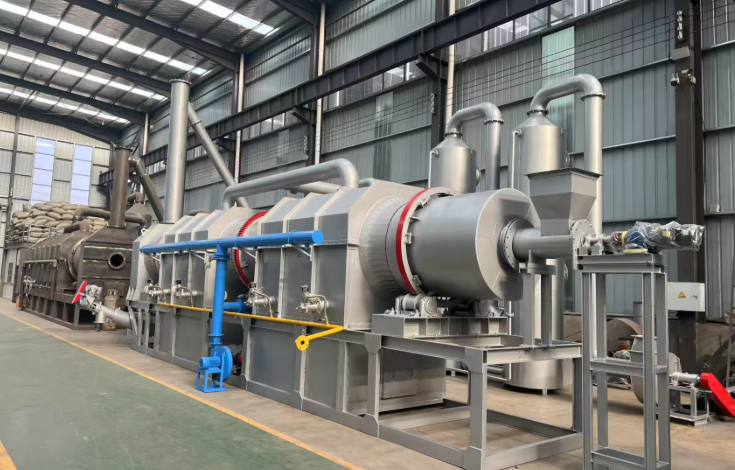Comprehensive Guide to Palm Kernel Shell Charcoal Machines and Continuous Carbonization Furnaces

Introduction
The increasing global emphasis on sustainable energy solutions has led to the exploration of alternative biomass sources for charcoal production. Palm kernel shells (PKS), a by-product of the palm oil industry, have emerged as a valuable raw material for producing high-quality charcoal. This guide delves into the intricacies of palm kernel shell charcoal machines and continuous carbonization furnace, highlighting their functionalities, applications, and considerations for implementation.
Understanding Palm Kernel Shell Charcoal Machines
1.1 What Are Palm Kernel Shell Charcoal Machines?
Palm kernel shell charcoal machine are specialized equipment designed to convert palm kernel shells into charcoal through a process known as pyrolysis. This process involves heating the shells in an oxygen-limited environment, causing them to decompose and form charcoal, along with by-products like syngas and bio-oil.
1.2 Key Components and Features
- Material Pretreatment System: Before carbonization, PKS undergoes drying and size reduction to ensure uniform processing.
- Carbonization Reactor: The core component where pyrolysis occurs, transforming PKS into charcoal.
- Cooling System: Post-carbonization, the charcoal is cooled to prevent spontaneous combustion.
- Gas Collection and Purification: Gases produced during pyrolysis are collected, purified, and can be utilized as fuel for the process.
- Charcoal Briquetting Machine: Converts the produced charcoal into uniform briquettes for various applications.
1.3 Advantages of Using PKS for Charcoal Production
- High Calorific Value: PKS charcoal boasts a calorific value between 5200 and 5500 kcal/kg, surpassing that of traditional biofuels.
- Environmental Benefits: Utilizing PKS reduces waste and contributes to carbon sequestration efforts.
- Economic Viability: The machine’s efficient conversion process offers a profitable venture for investors.
Exploring Continuous Carbonization Furnaces
2.1 What Are Continuous Carbonization Furnaces?
Continuous carbonization furnaces are advanced systems designed for the uninterrupted thermal decomposition of biomass materials, including PKS. These furnaces operate on a continuous feed mechanism, ensuring a steady output of charcoal.
2.2 Operational Mechanism
- Continuous Feeding: Biomass is continuously fed into the furnace, maintaining a consistent production rate.
- High-Temperature Pyrolysis: The furnace maintains elevated temperatures in an oxygen-free environment to facilitate efficient carbonization.
- Gas Recovery System: Gases produced are captured and can be utilized for heating or other energy needs.
- Automated Control: Modern furnaces are equipped with automated systems for temperature regulation and process monitoring.
2.3 Benefits of Continuous Operation
- Enhanced Productivity: Continuous operation leads to higher output without the need for frequent shutdowns.
- Energy Efficiency: The integration of gas recovery systems reduces external energy consumption.
- Consistent Product Quality: Continuous processing ensures uniformity in the produced charcoal.
See also: Importance of Lab Technologists in Modern Healthcare
Applications of PKS Charcoal
3.1 Agricultural Sector
- Soil Amendment: PKS charcoal enhances soil fertility and structure, promoting healthier plant growth.
- Animal Feed Additive: It can be used as an additive in animal feed to improve digestion and reduce odors.
3.2 Industrial Applications
- Alternative Fuel: PKS charcoal serves as a renewable energy source for various industrial processes.
- Metallurgical Industry: It acts as a reducing agent in metal smelting operations.
3.3 Environmental Impact
- Carbon Sequestration: The use of PKS charcoal contributes to long-term carbon storage, aiding in climate change mitigation.
Considerations for Implementing PKS Charcoal Production
4.1 Site Selection
Choosing an appropriate location is crucial. Proximity to PKS sources and access to transportation networks can reduce operational costs.
4.2 Regulatory Compliance
Ensure adherence to local environmental and industrial regulations to avoid legal complications.
4.3 Investment and ROI
Conduct a thorough financial analysis to assess the initial investment, operational costs, and potential returns.
Conclusion
The utilization of palm kernel shells for charcoal production presents a sustainable and economically viable solution. By investing in advanced palm kernel shell charcoal machines and continuous carbonization furnaces, businesses can tap into a profitable industry while contributing to environmental conservation efforts.
For more detailed information and procurement options, consider visiting reputable suppliers and manufacturers specializing in biomass carbonization equipment.




